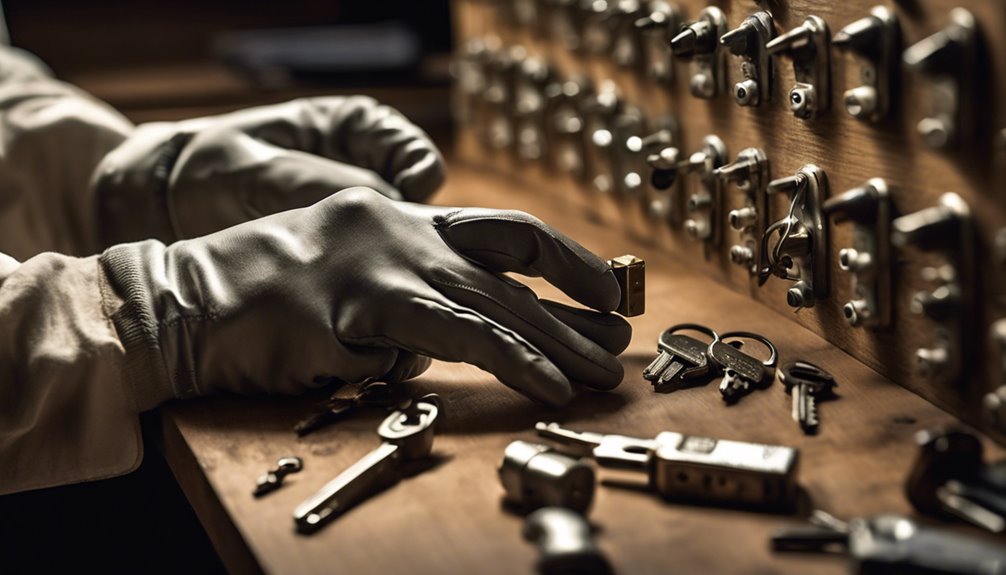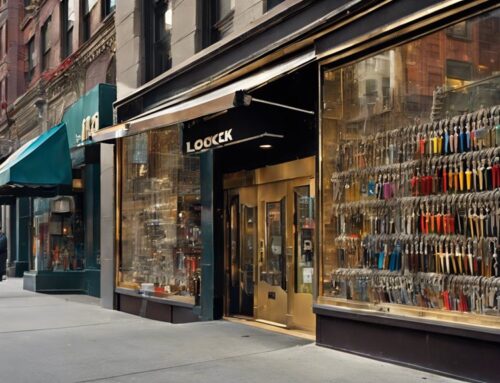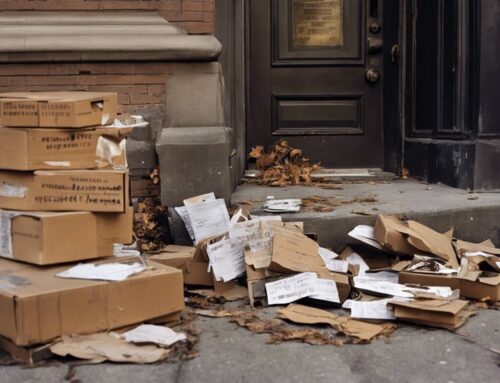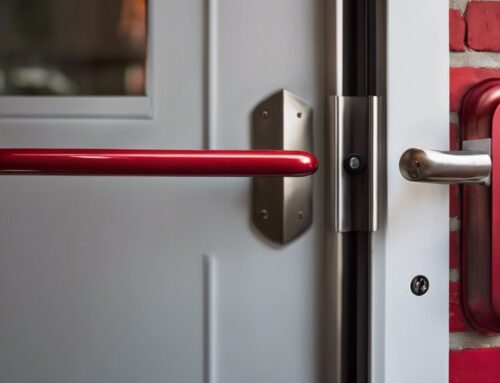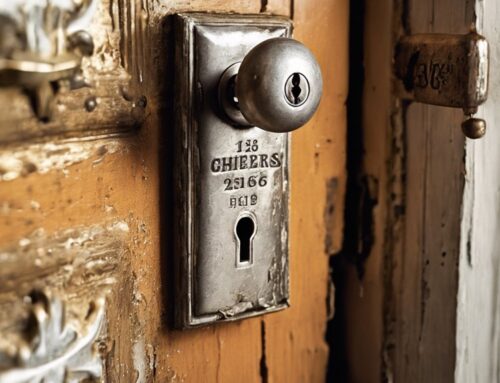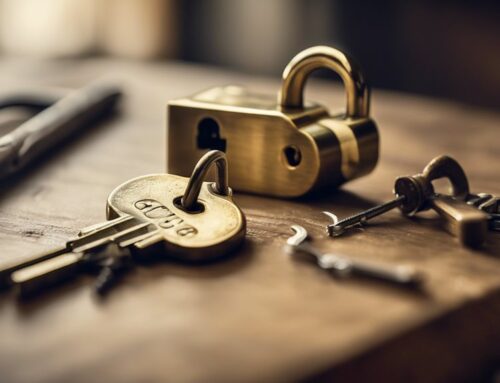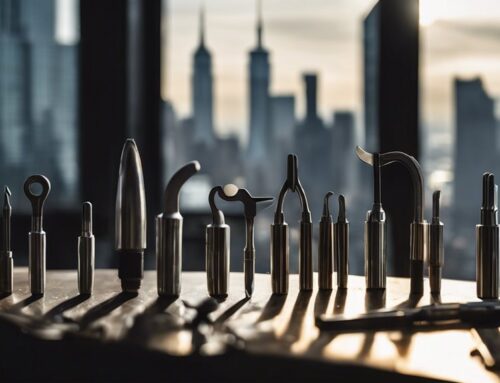It's a coincidence that just as you're learning about locksmith regulations, New York's SAFE Act is reshaping the landscape of security practices. You might not realize how the Act's stringent requirements on firearm storage are influencing what locksmiths must do to stay compliant. With new emphasis on thorough identity verifications and enhanced locking devices, the locksmith profession is evolving in unexpected ways. What does this mean for the safety and professionalism in your own community? Exploring these changes might reveal more about the critical role locksmiths play in maintaining security today.
Key Takeaways
- The SAFE Act mandates safe storage requirements, prompting locksmiths to provide secure firearm storage solutions for clients.
- Universal background checks require locksmiths to verify client identities and ownership before performing services.
- Increased regulations on firearm security lead locksmiths to enhance their compliance and operational practices for firearm-related services.
- Locksmiths must maintain a detailed logbook of services, including firearm-related installations, to comply with inspection standards.
- The SAFE Act influences client concerns over firearm safety, making trustworthy locksmith practices essential for building consumer confidence.
Overview of the SAFE Act
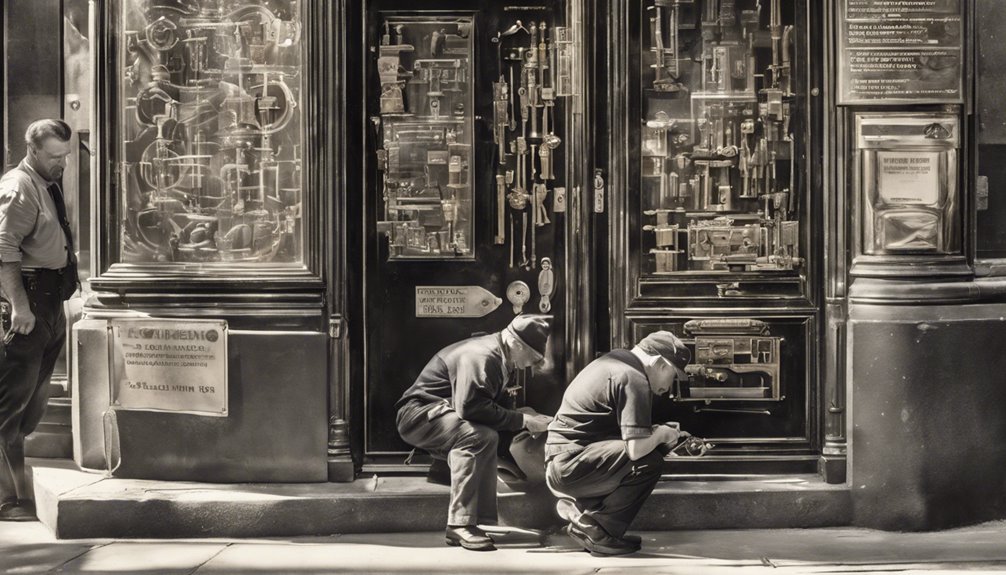
Since its passage in January 2013, the SAFE Act has considerably reshaped firearm regulations in New York State. This legislation was a direct response to tragic incidents like the Sandy Hook Elementary School shooting, aiming to enhance public safety through stringent gun control measures.
Dubbed the toughest gun control law in the United States, the SAFE Act fundamentally altered how firearms are defined and regulated within the state. You'll notice the act expanded the definition of assault weapons and imposed strict limitations on magazine capacities, restricting them to seven rounds unless they were pre-ban magazines. Additionally, it mandated background checks for private firearm sales and introduced requirements for safe firearm storage in homes with ineligible individuals. These measures highlight a clear intention to minimize gun-related risks. Furthermore, failure to comply with these regulations can lead to significant legal consequences, reflecting the importance of licensed work in maintaining safety standards. Notably, locksmiths must remain informed of these regulations as they are critical in ensuring compliance with the SAFE Act.
An important aspect of the SAFE Act is the establishment of a statewide database tracking individuals who can't possess firearms or ammunition. This database integrates prescription data and medical records, enhancing the capabilities of law enforcement while ensuring that sensitive information is exempt from public disclosure. Notably, the Act's provisions on high-capacity magazines were ultimately overturned in court, reflecting ongoing debates around its regulations.
Regular recertification of firearm licenses every five years confronts the challenge of outdated permits, while also increasing accountability.
Licensing Requirements for Locksmiths
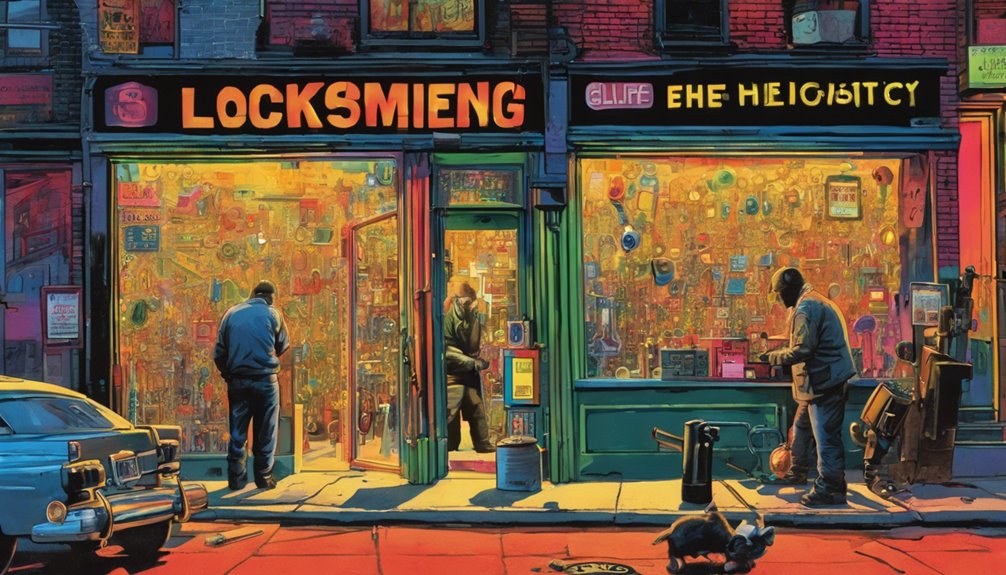
In New York City, you must navigate specific licensing requirements to operate as a locksmith. These regulations, enforced by the Department of Consumer Affairs, guarantee that only qualified individuals can provide locksmith services. To obtain a license, applicants must provide proof of locksmith qualifications, which can include certificates from licensed locksmiths or accredited courses. Additionally, understanding the state's lock picking laws is crucial for ensuring compliance and avoiding complications. Furthermore, successful locksmiths often complete training programs to enhance their skills and knowledge in the field. Non-compliance can lead to legal penalties, emphasizing the importance of adhering to these guidelines.
NYC Licensing Authority
The licensing requirements for locksmiths in New York City, governed by the Department of Consumer and Worker Protection (DCWP), guarantee that professionals in this field meet specific standards of competence and integrity.
To obtain a license, you'll need to submit a Basic Individual License Application either online or at designated centers.
Required documents include a valid photo ID, a current passport-sized photograph, proof of locksmith qualifications from accredited programs or endorsements from licensed locksmiths, fingerprints for a background check, and a Child Support Certification Form. This process helps ensure that applicants understand their legal responsibilities during eviction procedures, including the importance of adhering to the rules for changing locks post-eviction.
These steps aim to ascertain that only qualified individuals are allowed to operate as locksmiths. Additionally, obtaining a license ensures that you are compliant with state regulations that mandate licensing for locksmiths in New York.
Licensing fees range from $25 to $125, depending on your application date, with licenses valid for a period between six months and thirty months.
Payment methods include checks, money orders, or credit cards, though note the convenience fee is nonrefundable.
You'll receive an approval notification via email after the DCWP reviews your complete application.
Understanding these requirements enhances your path toward a legitimate locksmithing career in NYC, reinforcing the principles of safety and professionalism in your practice.
Legal Penalties for Non-compliance
Operating as a locksmith without the required license exposes individuals to significant legal penalties, which are strictly enforced by the Department of Consumer and Worker Protection (DCWP).
Ignoring these compliance mandates can lead to immediate and serious repercussions not only for the locksmith but also for any employing businesses.
- Unlicensed locksmiths may face fines and legal prosecution.
- Employers could be held accountable for hiring unlicensed workers, risking further penalties.
- Non-compliance may result in the denial or revocation of any existing licenses, putting a strain on master key system security protocols.
The DCWP thoroughly reviews applications and conducts background checks to guarantee that locksmiths meet all requirements.
If you operate without a license, you're jeopardizing your ability to practice legally. This includes the risk of being barred from the trade for significant periods.
Additionally, a criminal conviction affecting your fitness to work could lead to immediate license suspension or denial.
In a climate that seeks to protect consumers, understanding and adhering to these licensing regulations is essential. Moreover, locksmiths must be aware of their liability risks to safeguard their professional integrity.
The consequences of non-compliance not only affect your livelihood but also tarnish your business reputation, emphasizing the importance of accountability in locksmith practices.
Background Checks and Verification
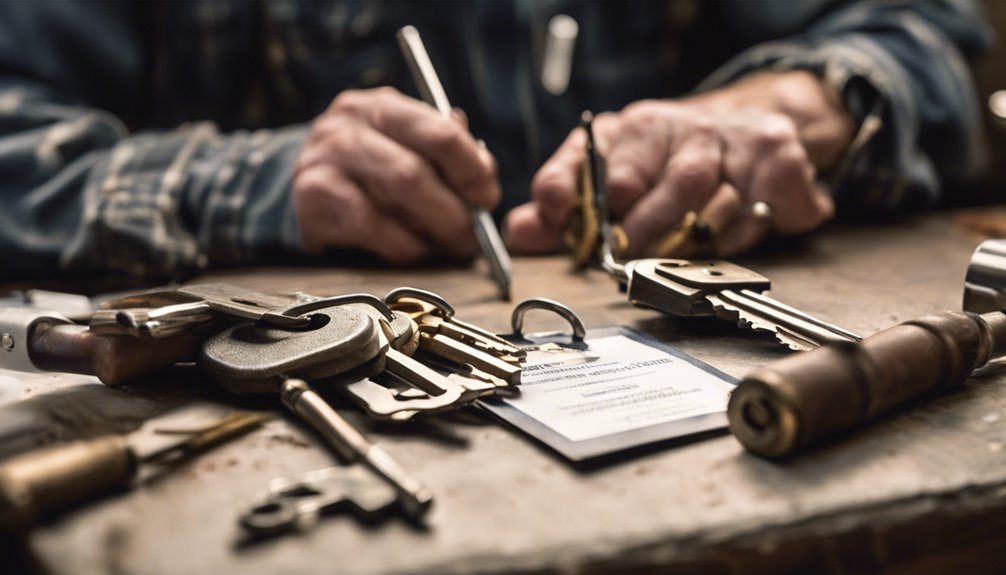
While New York state laws lack explicit requirements for background checks on locksmiths, local jurisdictions may impose their own regulations, leading to a varied landscape of compliance. Additionally, landlord and tenant rights can intersect with locksmith practices, particularly in situations involving lock changes.
As a locksmith in New York, it's vital to understand how these local laws can impact your practice. In some cities, background checks might be mandatory, while in others, they may be completely absent.
Even though there's no statewide requirement, many locksmiths choose to undergo background checks voluntarily or as part of their affiliation with professional organizations. This proactive approach may enhance your credibility and reassure clients about your trustworthiness.
If a local jurisdiction does require background checks, be aware that these may include criminal history, employment verification, and other relevant checks. Notification and consent are essential, as outlined by federal and state laws.
The New York State Clean Slate Act further influences how criminal history information can be utilized. It's important to remain compliant with these regulations to avoid potential legal issues.
Additionally, any employer conducting background checks must guarantee they're not infringing on sealed records. Locksmiths should also familiarize themselves with ethical standards to ensure they uphold integrity in their practices.
Training and Certification Standards

Understanding the training and certification standards for locksmiths is key to ensuring compliance and maintaining professionalism in the industry. Complying with these standards not only enhances your skillset but also underscores your credibility in a competitive market. The SAFE Act emphasizes rigorous training, including a documented qualifications process and apprenticeships, which may last up to 36 months.
Here are some critical aspects to evaluate:
- Apprenticeship Requirements: You need to complete 8,000 hours of training, covering both hands-on experience and theoretical studies. This includes specific focus areas like key and lock fabrication and repairs.
- Training Sources: Although no specific training sources are mandated, programs approved by the Department of Labor fulfill the requirement and may include various tasks like picking locks or maintaining safes.
- Certification Recommendations: While formal certification isn't explicitly required, it's advisable for professional standing. Should your proof of qualification be insufficient, examinations by licensed locksmiths may be necessary.
Also, apprentices must always work under the supervision of a licensed locksmith throughout their training period.
Though continuing education isn't expressly required, staying updated in your field through ongoing learning could be beneficial, considering the evolving nature of locksmith technologies.
Operational Regulations in NYC
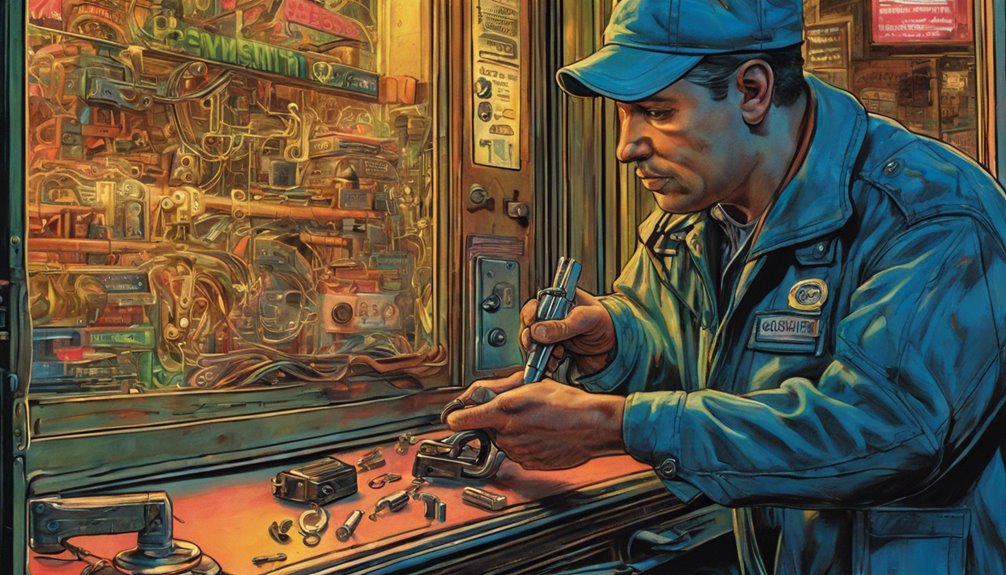
Maneuvering the operational regulations for locksmiths in NYC requires strict adherence to licensing and identification protocols to secure both compliance and consumer trust.
As a locksmith, you must understand that only licensed professionals are permitted to open locks for which a key or combination has been lost. Operating without a valid license can lead to legal consequences, including hefty fines. The licensing fee stands at $50, and it's imperative that you display your license prominently at your business location.
Identification verification is equally critical. You're required to record the names and addresses of clients requesting lock services, alongside their identification methods. Always make a good faith effort to confirm the identity of the person asking for access to a locked item. Obtaining proof of ownership before commencing work is non-negotiable and requires at least two forms of ID, confirming that you only service authorized individuals.
Maintaining thorough documentation is part of your operational responsibilities. A detailed logbook should document all services, including client names, addresses, and timestamps, and must be readily available for official inspection.
When providing services off-site, carry a photocopy of your license, and remain prepared to display it upon request. Master keys, to be produced only upon the signed order of the lock owner, must bear appropriate labeling.
Following these regulations not only secures compliance but also enhances your credibility and fosters trust with your clientele in New York City.
Compliance and Enforcement in Practice
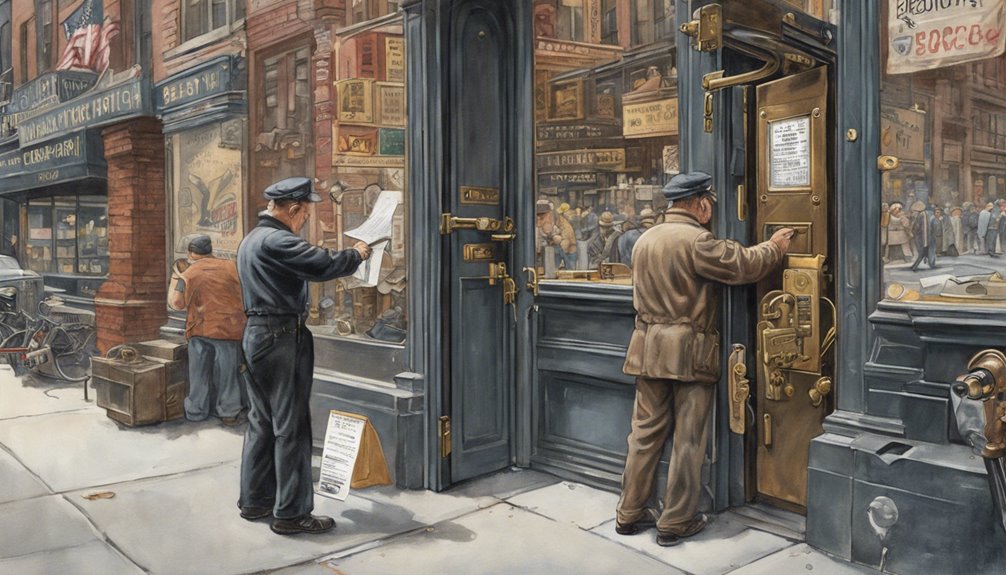
Compliance with regulatory frameworks is vital for locksmiths operating in New York City, as it directly impacts both business legitimacy and consumer safety. By adhering to the SAFE Act, locksmiths not only protect their businesses but also guarantee the safety of the community. Understanding the implications of compliance and enforcement is significant for sustainable practices.
Locksmiths face specific requirements that shape their daily operations, such as:
- Licensing and Record-Keeping: Operating without a proper license is unlawful, requiring meticulous documentation of services rendered.
- Safe Storage Laws: Compliance with laws regarding firearms storage is mandatory, reinforcing responsibility in handling sensitive equipment.
- Enforcement Mechanisms: The risks of fines, license suspension, or even revocation serve as significant deterrents against non-compliance.
The Division of State Police plays an important role in developing effective regulations and making sure locksmiths employ secure practices. Inspections by the Department of Consumer Affairs and law enforcement can lead to accountability.
When consumers report violations, a system of checks and balances is activated, allowing appropriate action against non-compliant locksmiths.
Consequences for violations are serious. Fines can accumulate daily, while multiple infractions escalate penalties. Therefore, maintaining compliance isn't just about legality; it embodies a commitment to integrity and responsibility.
Local vs. State Regulations
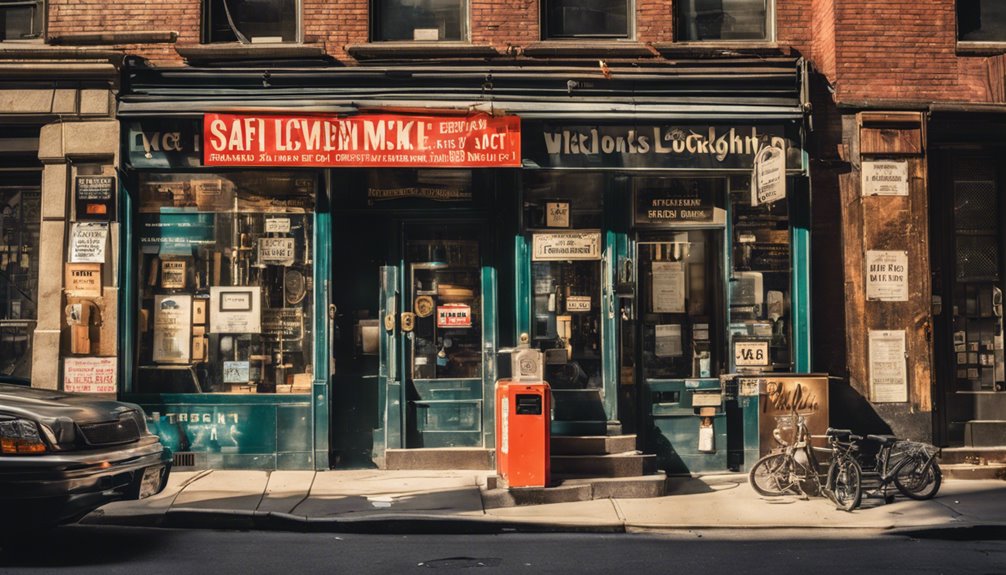
Understanding the differences between local and state regulations is essential for locksmiths operating in New York.
While New York City imposes specific licensing requirements and detailed compliance standards, the state laws provide a broader framework that supports these local rules.
This contrast highlights the importance of knowing both sets of regulations to guarantee full compliance in different areas.
NYC vs. State Laws
How do local and state regulations intersect in the domain of locksmith practices? In New York, licensed locksmiths must navigate local ordinances that dictate their operational standards while adhering to broader state laws. Local regulations are often more specific and stringent, focusing on licensing, identification, and operational protocols. In contrast, state laws provide a wider regulatory framework without directly addressing locksmith services.
- Local regulations govern licensing and operational practices.
- The SAFE Act doesn't influence locksmith practices directly.
- Compliance with both sets is essential for legal operation.
As a locksmith, you must comply with the unique demands of New York City regulations, including maintaining detailed records and verifying ownership before providing services.
While state laws create a general backdrop, they don't override these local requirements. Instead, state laws may indirectly affect business practices, but they lack enforcement mechanisms in locksmith activities.
Understanding this distinction is vital; it guarantees you follow the appropriate regulations without confusion. Ultimately, recognizing the separation between local and state laws empowers you to operate freely yet responsibly within the highly regulated locksmith industry.
Local Licensing Requirements
In the domain of locksmith practices, local licensing requirements in New York City present specific demands that distinguish them from broader state regulations. You need a locksmith license to carry out any mechanical lock services, a necessity enforced by the Department of Consumer and Worker Protection (DCWP). Unlicensed activities are unlawful, underscoring the importance of compliance with local regulations.
| Requirement | Details |
|---|---|
| Application Process | Online or in-person; fees range from $25 to $125. |
| Documentation Needed | Valid ID, proof of qualifications, and fingerprinting. |
| Record Keeping | Maintain a service record book and client authentication. |
As a licensed locksmith, you must display your license on demand and keep records for inspection. Client authentication is essential, requiring you to verify identity and ownership before providing service. With strict oversight, maintaining compliance not only protects your business but also elevates the industry's standards. Understanding these regulations gives you the freedom to operate confidently in your trade while ensuring safety and accountability for your clients.
Compliance for Different Areas
While local regulations impose stringent requirements that directly influence locksmith practices, state laws play a more subsidiary role. You must adhere to local rules, as they dictate specific locksmith licensing, identification, and equipment protocols.
State regulations, such as consumer protection laws, provide a more general framework, but don't override local mandates.
Key components of local regulations include:
- Locksmith Licensing: Only licensed individuals can perform lock services and are required to keep detailed records.
- Identification and Authorization: You must verify the identity of clients and secure their authorization before any work.
- Equipment Regulations: Locksmiths must label keys and equipment with their license information for accountability.
In contrast, the SAFE Act primarily addresses firearm regulations, leaving locksmith licensing unaffected.
The state may impose broader business guidelines, but the detailed practices you follow are firmly rooted in local legislation.
Consequently, it's crucial to stay informed about your area's regulations to maintain compliance, safeguard your practice, and guarantee client trust.
Ignoring these local requirements can lead to severe penalties, including possible license revocation.
Key Disposition and Record Keeping

As licensed locksmiths engage in their practices, they must adhere strictly to established key disposition requirements and record keeping protocols to guarantee both security and compliance with the SAFE Act. Each key you create needs to be stamped with your name, address, or license number to maintain accountability.
Master keys must bear the word "master," and duplicating these keys requires a signed order from the owner or authorized agent. You can't dispose of master key blanks, code books, or skeleton keys to anyone but a licensed locksmith, ensuring that sensitive equipment remains secure.
Your records play an important role in your operations. You must document the names and addresses of individuals requesting services, including their identification methods and ownership verification. Every transaction should note the date and time, maintaining transparency.
The records need to be kept in a specified format, readily available for inspection by authorized personnel. Before opening any locked item, you must obtain two forms of identification from the requestor and document their ownership proof in detail.
The signature or mark from the individual on a prescribed form is essential, and you're required to retain these forms for 18 months. This meticulous record-keeping not only reinforces your credibility as a locksmith but also serves as a defensive measure against potential disputes.
In following these guidelines, you uphold the principles of safety and trust inherent in your profession while enjoying the freedoms afforded by compliance with the SAFE Act.
Penalties for Non-compliance

Failure to comply with locksmith regulations can lead to significant penalties that impact both your business and professional reputation. New York City's stringent guidelines impose monetary fines for various infractions, which can accumulate rapidly if not addressed. Understanding these regulations is critical to avoid detrimental consequences.
Consider the following penalties:
- Operating without a locksmith license: $100 per day
- Failure to comply with key marking requirements: $375 for the first violation, escalating to $500 for defaults
- License suspension or revocation: Possible action by the Department for severe violations
Each regulation infraction can compound your penalties, especially with repeat offenses occurring within two years. The first violation incurs a fee of $375, but subsequent ones carry heftier fines, with defaults increasing financial liability.
Additionally, failing to maintain proper documentation or displaying your license can result in further fines and detract from your credibility in the industry.
Moreover, non-compliance can lead to license suspension, which disrupts your business operations. Your responsibility is to stay informed about the current laws and any amendments enforced by the City Council.
Regularly reviewing your practices guarantees you remain compliant and minimizes the risk of costly penalties that could affect your future as a locksmith. Ultimately, being proactive about these regulations isn't just about avoiding penalties—it's about safeguarding your business integrity and professionalism within the locksmith community.
Influence of the SAFE Act on Practices
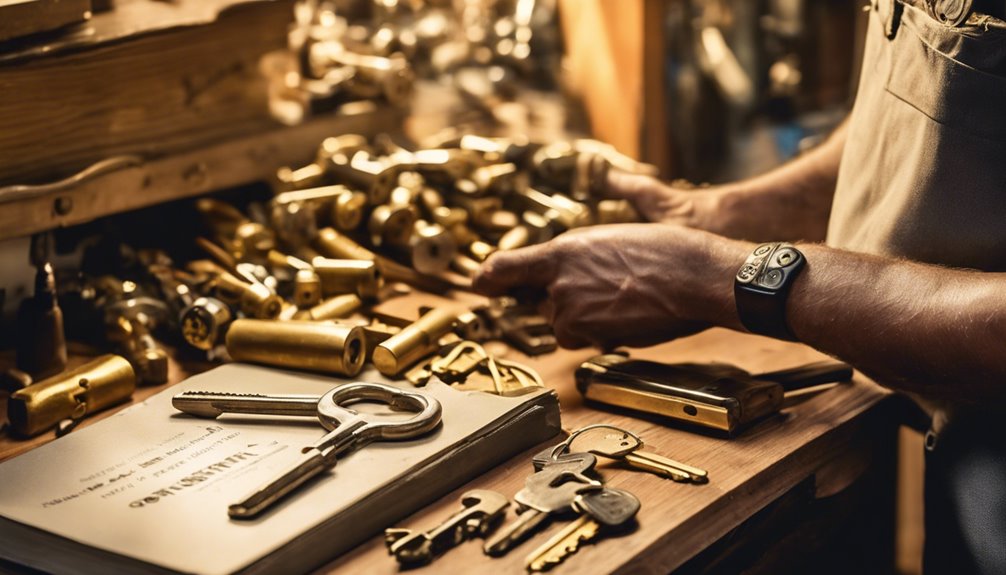
The SAFE Act greatly impacts locksmith practices by introducing specific requirements for storing firearms securely.
As a locksmith, you'll need to guarantee that the locking devices you install comply with the standards set forth by the law.
This regulation not only affects your technical work but also requires you to adopt stricter protocols for verifying identity and authorization from clients.
SAFE Act Overview
While many view the NY SAFE Act as a legislative response to escalating gun violence, its influence extends far beyond mere regulation. The Act fundamentally reshapes the landscape of firearm ownership and safety protocols in New York, creating ripples that touch various sectors, including locksmith practices.
You'll notice the following key provisions that have notable implications for both firearm owners and service providers like locksmiths:
- Universal background checks for gun purchases.
- Mandates for safe storage of firearms, particularly for individuals with felony convictions.
- Requirements to report lost or stolen firearms within 24 hours.
These measures bolster not only public safety but also the responsibility of firearm owners.
As a locksmith, you might find that customers are increasingly concerned about how they secure their firearms while complying with these new regulations. The Act's effects extend to the tools and techniques you may use to assist clients in achieving compliance with safe storage mandates.
Locksmith Regulation Impact
As locksmiths navigate the evolving landscape shaped by the SAFE Act, they must adapt their practices to comply with stringent regulatory requirements.
In New York City, having a locksmith license isn't just a formality; it's mandatory. The NYC Department of Consumer Affairs administers licensing, and applicants face criminal background checks and may need to provide proof of liability insurance. You'll need to display your license when working, ensuring transparency.
Operational regulations require you to meticulously document the name and address of clients, along with the date and time of services. You must verify identification and ownership before proceeding.
For off-premises work, presenting a photocopy of your license is non-negotiable. Retaining signed consent on prescribed forms is essential and available for inspection.
Non-compliance can lead to severe penalties, including the loss of your license. Regular inspections by authorized personnel reinforce accountability.
These measures ultimately enhance consumer protection, ensuring only authorized individuals receive services. By embracing these regulations, you foster trust and uphold the integrity of the locksmith profession, aligning with the spirit of freedom through responsible practice.
Frequently Asked Questions
How Does the SAFE Act Affect Locksmith Business Insurance Requirements?
The SAFE Act doesn't directly impose requirements on locksmith business insurance.
You need general liability insurance as a standard practice. If you employ workers, New York mandates workers compensation insurance for coverage of employee injuries.
While professional liability insurance is recommended for protection against malpractice claims, it's not legally required.
Ascertain you comply with state laws governing insurance, as they shape your business's legal and operational landscape independently of the SAFE Act.
Can Locksmiths Provide Services for Firearms-Related Locks Under the SAFE Act?
Locksmiths can provide services for firearms-related locks like a skilled surgeon operates with precision. They must adhere to legal guidelines, ensuring they're licensed and familiar with firearm storage regulations.
Verification of ownership is essential before accessing gun safes. Their expertise allows them to open, repair, and maintain these locks while ensuring safety and compliance.
What Liability Protections Do Locksmiths Have Under the SAFE Act?
Under the SAFE Act, locksmiths don't receive specific liability protections.
Instead, general industry regulations govern your practices. You're expected to be licensed, verify the identity of clients, and maintain detailed records of your work.
These steps help protect you from legal repercussions and false claims. By complying with these regulations, you minimize your liability while ensuring that your services remain legitimate and trustworthy.
Keeping organized documentation further safeguards your reputation in the field.
Are There Any Special Permits Needed for Gun Safe Locksmithing?
When it comes to gun safe locksmithing, think of it as a puzzle where each piece must fit perfectly.
You don't need special permits beyond the standard locksmith license issued by the NYC Department of Consumer and Worker Protection.
Just make sure you have the required qualifications and pass a background check.
It's essential to stay compliant with all related regulations to provide secure solutions without running into legal trouble or violating guidelines.
How Does the SAFE Act Influence Customer Privacy for Locksmiths?
The SAFE Act influences customer privacy by enforcing stringent data protection measures for locksmiths.
You need to implement secure practices, ensuring client information remains confidential. Strong passwords, detailed records, and secure key storage are essential.
Transparency in how you handle data fosters trust with customers. By adhering to regulatory standards, you not only protect client privacy but also enhance your reputation, paving the way for more secure and responsible locksmith services.
Conclusion
In summary, New York's SAFE Act has reshaped locksmith practices, much like a key fitting into a well-crafted lock—each element must align for ideal security. By implementing rigorous licensing requirements, background checks, and operational regulations, locksmiths guarantee they meet the heightened safety standards. As concerns about firearm storage grow, you'll find these professionals evolving to adapt, reinforcing their role as guardians of safety in your community. Embracing these changes is essential for fostering trust and reliability in their services.

